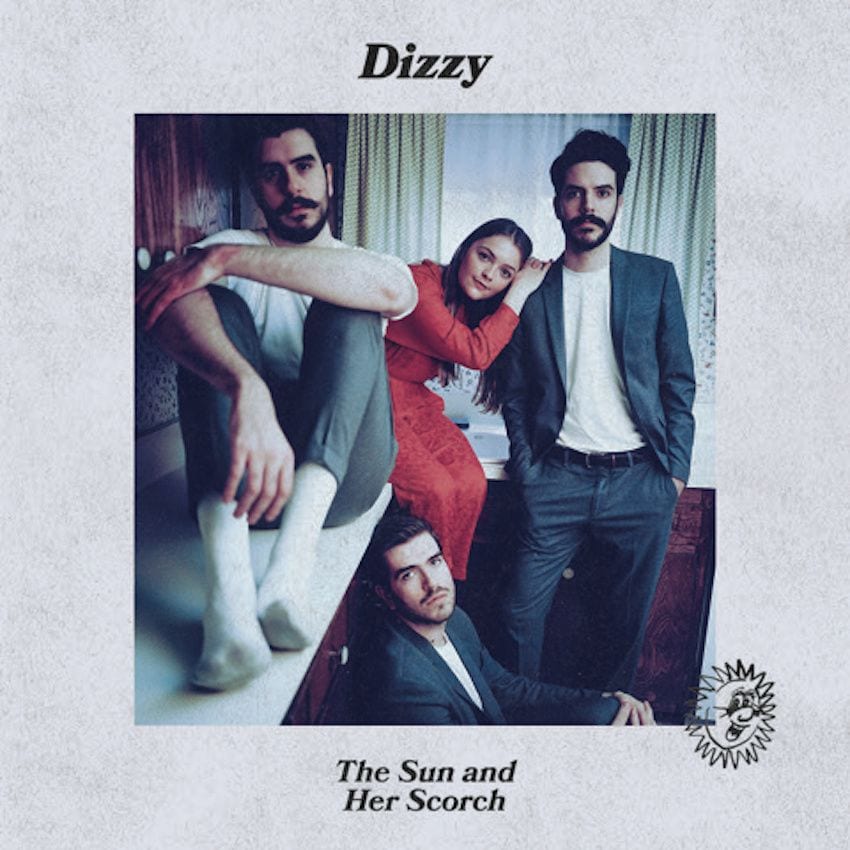
For a relatively new band that cut its Baby Teeth while using that title for their debut album in 2018, Dizzy frontwoman Katie Munshaw and her fellow members sound like they’ve already benefited from years of experience. The Canadian dream-pop outfit of 20-somethings that Munshaw formed in 2015 with the Spencer brothers — Charlie (drums), Mackenzie (bass) and Alex (guitar) — not only won a 2019 Juno Award for “Alternative Album of the Year”, but also wasted little time in quickly following up, sophomore jinx be damned.
The result is The Sun and Her Scorch, a devastating beautiful and profoundly personal full-length album they produced by themselves as a little recognition helped develop their maturity, self-confidence and sense of purpose. It will be released Friday (July 31) on Royal Mountain Records. “I think we’ve learned when you hire a producer you’re relieved of a huge amount of the workload, but in turn, you hand over creative control,” Munshaw replies in an email interview for this article. “I don’t think there’s a right or wrong way to go about producing a record (with or without help), but for this album, we wanted to challenge ourselves to do it alone.”
Comparing the work on each track to figuring out a big puzzle, she adds, “So it’s hugely rewarding to step back and listen to the record knowing we solved each song to the best of our ability and are proud of how they sound.” Munshaw, who wrote all the lyrics for the album’s 11 tracks, relies on deep introspection to create relatable experiences for like-minded young adults who are teetering on the edge of a world in upheaval.
That’s quite an accomplishment for a seemingly typical resident of Canadian suburbia who struck up a friendship with Charlie Spencer in the ninth grade at Maxwell Heights Secondary School in Oshawa, Ontario before they sang together in the school’s choir. While Charlie is “annoyingly good at Chinese yo-yoing and Rubik’s Cubes and honestly just about everything else he tries in life,” Munshaw points out that “Mackenzie is obsessed with planes, bugs and birds” and “Alex teaches guitar lessons to kids, and he rocks at it. (Duh.)”
The band originally called Good Ghost eventually changed their name to Dizzy “when we decided to start taking music seriously. It took us months and months. One day I sent Dizzy into our group chat, and everyone seemed to agree on it. There’s nothing special about it, we just liked the sound of the word, but I think it suits us really well,” offers Munshaw, who studied communications and journalism in college but gave that up for a music career.

Dizzy emerged from playing gigs in local bars to signing a deal with Royal Mountain Records and hitting the road with major acts such as Death Cab for Cutie and Tokyo Police Club, an Ontario neighboring band that was among the 2019 Juno alternative album nominees. Touring in Europe and the United Kingdom to start 2020, it was inconceivable to think anything could stop Dizzy — until the global pandemic hit in March. Saying it’s “strange” to release a record during these unprecedented times, Munshaw adds, “Touring is a big part of a record cycle normally, so it’s been hard to keep my brain busy without it. We’ve been trying to focus on new ways to make the record experience interesting for listeners cooped up in their homes.”
Already taking a deep dive into several The Sun and Her Scorch numbers with a series of YouTube episodes called “Liner Notes”, Dizzy will throw a digital release party on 31 July, playing a few songs and conducting a Q&A during a livestream at sidedooraccess.com. Asked what she misses most about those days before social distancing, Munshaw responds, “I think the obvious answer would be shows, but if Halloween is canceled, I think I’ll be most devastated about that. We take Halloween very seriously at my house.”
Life in Oshawa, not quite an hour’s drive east of Toronto, still plays a major part in the dizzying existence of Munshaw and Co. Though the band members live apart from each other, they communicate regularly via Facebook messenger. They recently have been able to meet since Canadian provinces such as Ontario are allowing “social circles” of up to 10 people interacting without physical distancing.
While recording the album before the coronavirus started wreaking havoc, they even did some fine-tuning in the basement of the house where Munshaw’s mother Karen resides. “It was sweet,” recalls Munshaw, whose sister Beth joined the family affair by providing backing vocals — “she sounds exactly like me” — on ‘Good and Right’. We’d done the majority of the tracking already at a studio in Montreal [Studio Frisson at Mechanicland Studios]. But we did a lot of the lead vocals, backing vocals, editing, and experimenting in the basement. It gave us the freedom to spend hours on small details in a song without worrying about studio costs or making our engineer sit around all day. The record wouldn’t sound the way it does without the work we did in the basement.”
Extra personal touches are heard throughout the album in the form of Oshawa references on “Roman Candles” and recorded voices of close family members on “Worms” and “Ten”. “And I’m just stuck in this town I can’t handle / Watching you light it up / From a north end parking lot / While I’m just setting off roman candles.”
Asked about one of the above lyrics in “Roman Candles”, which also includes a contribution from the Maxwell Heights Secondary School Choir, Munshaw reveals, “Oshawa has an odd reputation that I’ve never really understood. Probably because I’m too close to it. From surrounding cities, it’s seen as a rough place, and I know some parts of it are, but it was a pretty normal suburb to grow up in. “‘Roman Candles’ is filled with Oshawa nods from things as simple as street names and neighborhoods to the encouraged social norms of going to college and getting a 9-to-5 job that are pressured on young people in the area.”
The album opens with a voicemail from Munshaw’s grandmother on “Worms”. “That song is about feeling trapped in sadness, so starting the record off with my grandma calling me to check in and ask me if I want to grab a coffee with her symbolized having someone who loves and supports you through depressive episodes. I love her so much,” Munshaw explains. “When I told her she was the voice people would hear first on the record, she teared up. I’ve never seen her cry, so it was really special.”

Photo: Pooneh Ghana / Courtesy of the artist
For “Ten”, a song Munshaw says is about “growing old with someone and dying. Till death do us part, that whole schtick,” she found her parents’ entire wedding audio on tape in the basement. It became a “no-brainer” to use a voice clip of her mother reciting wedding vows “because we knew it suited ‘Ten’ so well”.
On an emotional scale from 1 to 10, “Ten” was the most difficult of the album’s songs to write, Munshaw asserts. Its impactful conclusion might make it the best of the bunch, too. “It taps into my fear of death and aging throughout the whole song,” she adds. “I’m literally yelling goodbye to my dying lover by the end of it, and it’s kind of exhausting in the way that sad things, when you think about them too much, can zap the energy out of you.”
Though many of Dizzy’s sensitive songs sound subdued while blessed with Munshaw’s soothing voice, they are filled with hurt feelings, lonely hearts, and tortured souls. A sports analogy here might be a stretch, but imagine how the rewards of overcoming such anguish might compare to the exultation a skillful player or avid fan experiences during an intense game. The thrill of victory/agony of defeat is overused for a reason.
Then realize why a mellow, level-headed artist with a resolute nature, who had to be encouraged by her parents to learn to play the guitar and piano, considers herself “a modern-day Troy Bolton”, the wildly popular singer/star athlete/romantic hunk portrayed by Zac Efron in the High School Musical franchise. “I played competitive sports my whole life,” says Munshaw, who participated in hockey and lacrosse teams. “I’m secretly a big jock who also loves theatre and music.”
Saying the only sport she follows now is basketball (“I don’t have cable, so I stream it like a peasant”), Munshaw’s favorite NHL team during her youth was the Ottawa Senators “because I had a crush on [former star] Martin Havlat,” she admits. “I was a simple woman who enjoyed a good beard. Sue me. Also, my dad [Mark] would have disowned me if I was a [Toronto Maple] Leafs fan. He’s a [Boston] Bruins boy through and through.”
While Munshaw is undoubtedly fired up about the future, expect the following expression to apply when Team Dizzy finally can celebrate the return of live music as well as the wide world of sports: Game on! Then guess who will be playing to win.
ENCORE: MORE HIGH NOTES FROM DIZZY’S KATIE MUNSHAW
How does the album title The Sun and Her Scorch relate to the songs?
The title is taken from the song “Ten”. In the lyric, the phrase is meant to be taken literally, referencing the sun and its actual heat. But in relation to the record, I thought it was a perfect metaphor for myself and all the ways I can be harmful to myself and others, which is a theme that runs through the album.
How does this album compare with Baby Teeth, Dizzy’s debut release? How concerned are you in trying to top a Juno Award-winning album?
Most of the songs on Baby Teeth were written before we even knew we were going to make that record. They always just existed in the world of Dizzy. I think we felt less pressure to make a record that would be critically acclaimed and more concerned with if we could still write good songs. Any artist will tell you that your newest song feels like it’ll be your last. At least for me, songs come from ideas that haven’t happened yet. It’s like this weird brain space that is waiting for you to find it. You can’t get to that place through practice or following certain steps or whatever, it just kind of appears one day like magic. That sounds really pretentious, but it’s true. Songwriting reminds me a lot of fishing. It’s waiting and waiting, and then when you get a bite, you’ve got to act quickly.
How much of a struggle is it for you to get heard in a band where all the other members are brothers? Do you ever get outvoted or feel outnumbered?
I always get asked what it’s like to be in a band with brothers, and I never know what to say. I wish I had juicy gossip or some funny arguments to share. I never really think of them as brothers until someone brings it up. They’re all so different. The truth is we’re all just four dumb friends who like making music together. On tour, we like to go back to our hotel, watch Big Mouth or some silly YouTube videos, and scope out the vending machine snacks. Being in a band is tough and has its challenges, but I think if anything, those challenges have been dampened by the three of them being family, and me feeling like I’m a part of it.

Photo: Pooneh Ghana / Courtesy of the artist


![Call for Papers: All Things Reconsidered [MUSIC] May-August 2024](https://www.popmatters.com/wp-content/uploads/2024/04/all-things-reconsidered-call-music-may-2024-720x380.jpg)



